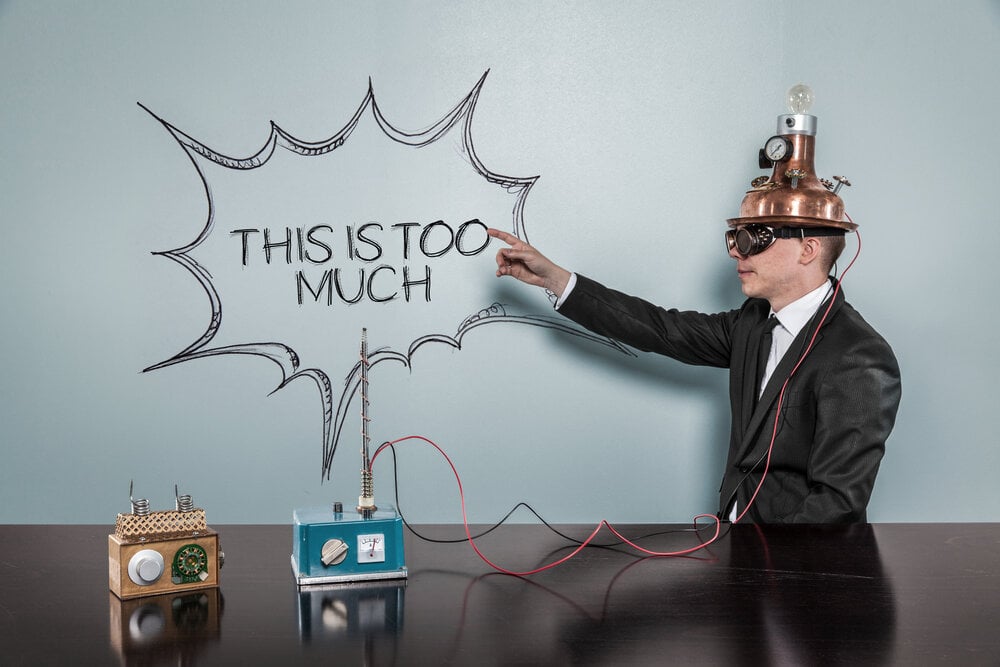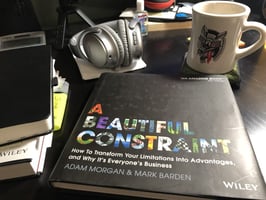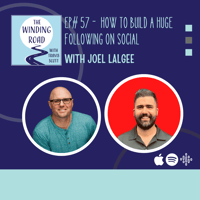With everything going on right now, I’ve been thinking a lot about being a professional. Most...
3-Week Information Detox

Knowledge is power. But access to too much information could have a negative effect on your life and career.
Over the past week, I’ve been waking up every morning with a sense of dread. A sense of being overwhelmed. This seems to be a cycle. And it’s all self-imposed.
I have an active mind. I love trying new things and learning and am always coming up with ideas. I’m definitely the ‘idea guy’ and not the organization/project manager guy. I’ve recognized this and recently delegated the project management I’ve typically been responsible for to someone on my team whose strengths are much more aligned with that kind of work.
In my opinion, one of the traits of a good leader, really anyone, is understanding your strengths and maximizing them but also understanding your weaknesses. When it comes to leadership, weaknesses are things you can delegate or hire for. It’s a huge waste of time to focus any energy on trying to improve them when there are a host of things you’re already good at.
A bit of a digression, but it fits into the topic I’m writing about, which is simplifying your life and maximizing your time. Which, ultimately, will improve the quality of your personal and professional life- and could help you make more money.
Back to my story of the morning dreads. Usually, whenever I have an idea, I start working on it. Which is actually a bad idea.
When I do this, I usually don’t eliminate something to make room for this new focus. I just pile on. Another bad idea.
The Tipping Point
At some point during the year - it always seems to be summer for me - I start to feel overwhelmed. The edges of my limited organizational capabilities start to fray. I start to feel like I’m losing control of everything. I can’t focus and feel scatterbrained. And you know what, it’s because I am.
I usually hit a tipping point and then start to walk away from things because it’s too much. I’m feeling burned out.
There are also things piling on that shouldn’t be piling on. Things like subscribing to too many email newsletters, email in general, social media, reading and watching the news, watching more than an hour of TV a day, reading too much- especially blogs and non-fiction, watching videos, among other things.
Too Much of Anything Can Be Bad- Even Information
It is possible to have too much information. Or at least to be consuming too much information. The more we fill our head with, the more it begins to impact our happiness. Cara Bradley wrote a great article on this topic on Oprah.com. I would suggest reading it.
One way I try to limit what I keep in my head is to use a technique I learned from reading David Allen’s book “Getting Things Done”. That is to capture everything. Get it out of your mind and put it somewhere else.
I use Evernote to capture random thoughts and Todoist to capture tasks or things I need to get done.
If you follow the Winding Road on social media (LinkedIn, Instagram, Facebook, and Twitter), you’ll notice that I like quotes and share one every Monday that I hashtag #mondaymotivation. I think it’s a great way to start the week and get us re-centered.
The reason I brought that up is that I recently heard a quote that sums up this entire article and actually was the genesis for my motivation to write this.
It’s from Herbert Simon:
“... a wealth of information creates a poverty of attention.”
That was the most truthful thing I had heard in a long time and the timing was perfect for how I had been feeling.
I Read A Lot, and You Probably Do Too
I read a lot. I love reading. I read books- mostly non-fiction (I’m reading two right now and am also listening to two). I listen to podcasts whenever I can. I don’t commute so it’s normally when I’m running or doing yard work (at least when the Cincinnati Reds aren’t playing). I subscribe to at least four email newsletters that I read first thing in the morning. I follow quite a few marketing influencers on Twitter and read things they share. I love sports and subscribe to Sports Illustrated (offline) and The Athletic (digital). I get two physical newspapers each morning - The Wall Street Journal and The Spokesman-Review (local Spokane newspaper).
That’s just what I read each day! Then when I think of the other projects and activities I’m engaged with, both in and outside of my paid work, no wonder I’m overwhelmed.
Here’s a list I wrote of all of the things I’m engaged with:

It’s also summer and I love plants and gardening. The fact that the original owner of the house I bought was a master gardener was a huge plus for me. I knew there was a great base I could work with. As a result, I spend a ton of time tending to my yard and garden. That’s probably why I typically reach my tipping point in the middle of summer.
Here’s my garden (I'm pretty damn proud of it):

So what does all of this have to do with professional growth? EVERYTHING.
You can’t grow if you’re overwhelmed and burned out. And both are going to happen to you at some point if they haven’t already. Which, will lead to stress and, ultimately, bad decisions. Bad personal decisions and bad professional decisions.
We’re going to change that by trying doing a 3-week challenge. This was inspired by one of the audiobooks I’m currently listening to, The 4-Hour Work Week, by Timothy Ferriss.
In his book, Tim Ferriss proposes doing a “media fast”. This includes cutting out all media for five days.
Since hearing of this, I’ve been giving it some thought and am going to propose that we change it up a little bit (which probably comes from my science-focused education and outlook on life).
Instead of just a one-week fast, it’s going to be broken into three weeks.
Week 1: Data capture
In Week 1 we need to lay the foundation for what we’re going to change and also realize what we’re dealing with. I hope this first week will further motivate you to continue with Week 2 of the challenge. It may be an eye-opener.
It’s also important to get a baseline of our current behavior so we know what needs to be changed. To quote one of my favorite business leaders, Peter Drucker:
“What gets measured gets managed.”
With that said, in Week 1 we’re going to track how we spend our time. This is only for 5 days. I’m proposing we do this next Monday - Friday. That gives us the rest of this week and weekend to find the best time-tracking tool to fit our needs and get organized.
Time-Tracking
I found this great list of free and paid time-tracking tools on Entrepreneur.com.
The next step is to create a list of categories you will track. Give this some serious thought. Think about how you spend your days now. But I realize you won’t be able to think of everything, so create an “other” category that you can break out more specifically if needed when the week is over and you’re analyzing your results.
Here’s my list:
- Paid work: i.e., your ‘day job’ and paying side gigs
- Unpaid projects: side gigs, blogs, podcasts, or anything else that you’re doing that some people get paid for, but you’re not.
- Hobbies
- Exercise and wellness
- Family time
- Errands (outside the home)
- Household tasks
- Distractions (this includes reading non-fiction, reading blogs, email, listening to non-music, TV, videos, reading news, watching the news, etc)
- Education: Courses or formal training
- Commuting
- Social: Time spent with friends, neighbors, and other non-family members
- Other: This can be used to capture what you may not have thought of and can be recategorized later
Work really hard to capture everything you do. Even if it’s just a minute or two. This is going to be extremely difficult, especially in the first few days. But that’s why it’s important to find an app that you can install on both your phone and computer.
Here’s a good read by someone who did this for 30 days. Recommended reading between now and next Monday.
And remember, it’s ONLY 5 DAYS.
Week 2: Media fast
This is the heart of the challenge. For another five days (another Monday - Friday), you’re going to cut out all media.
This includes blogs that aren’t directly tied to a project you’re working on, news (reading, watching, listening), podcasts, non-fiction books (you can read up to one hour of fiction per day), TV (you can watch up to one hour of TV per day), especially social media, web browsing (for non-productive, non-work related things), and anything else you identified in the previous week’s time tracking that could be seen as a distraction.
The only thing you can listen to during these five weekdays is music. No podcasts. No audiobooks. No news or sports talk shows. ONLY MUSIC. Again, it’s only 5 days. Suck it up.
Week 3: Reflect, Design, and Implement
"Our life is frittered away by detail. Simplify, simplify."- Henry David Thoreau
Henry David Thoreau was a really smart guy. He may have had a goofy beard, but a lot of what he’s written or said in the 1800s still applies today. Maybe more so today.
As you reflect on the time tracking you did in Week 1 and the media fast you did in Week 2, think about how complicated you’ve made your life by all of the distractions you’ve introduced.
Think about how much simpler life was in Week 2.
Were you able to think more clearly? Were you less stressed? More focused?
What are your values and how does the future use of your time align with those?
During the media fast, what did you realize you could live without? What wasn’t as important as you made it out to be prior to the fast?
How can you better use technology to simplify your life?
Can you implement a new technique to help? Something like the “Conscious In, Conscious Out” method outlined by Naomi Dunford in her fantastic post “The Fastest Way to Save Time on EVERYTHING”?
Did you find that you have become overwhelmed and consumed by some of the tools and technology that you were using?
My boy, Henry David Thoreau had a thought on that as well:
"Men have become the tools of their tools."
Really get to the heart of what is important to you. Where you want to consciously spend your time and what you will cut out or, at least, severely limit moving forward. Make a plan and stick to it.
Let everyone know how it's going or worked out for you in the comments below or use the contact page of the site to share any thoughts or ‘ah ha’ moments you’d like me to include on my upcoming podcast about this challenge. I’d love to hear how it went for you and if it changed your life and outlook.
Engagement
Another component of this project is sharing your thoughts and progress, encouraging others, and general engagement. I’d like you to check-in periodically to let everyone know how it’s going and offer encouragement to others. You can do that in the comments section of this post below. I would ask that you use a hashtag (#3weekinfodetox) on Twitter or join my Facebook group, but social media is off limits in Week 2, remember.
I truly believe that by engaging with one another it will help you accomplish what you want to accomplish.
One last quote, this one by Helen Keller:
“Alone we can do so little, together we can do so much.”
In Conclusion
So that’s it. Let’s do this thing and regroup in four weeks to see how it worked.
As I mentioned, I’d love to share your thoughts on how this 3-week challenge has changed your life in one of my August podcasts. Please email me anything you’d like me to mention in that show.
Let's go kick some ass!
-1.png?width=400&height=100&name=Website%20Logo%20-%20400x100%20(transparent%20background)-1.png)

